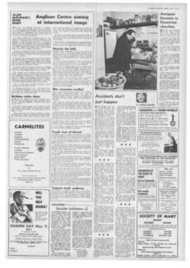Page 4, 1st May 1970
Page 4

Report an error
Noticed an error on this page?If you've noticed an error in this article please click here to report it.
Tags
Share
Related articles
The Laity In Their Place
Vatican Reveals Pope's Secret Celibacy Plea
Uphill Task For Pope In Dutch Unity Bid
Mutiny, Hope And Bewilderment In Dutch Church
Warning Against Lip-service To Vatican Ii By Bishop Worlock
Even Holland has moderates and Latin Mass
from Gerard Noel in Holland
FOLLOWING Bishop Zwartkruis's summing up of the Dutch Pastoral Council in last week's CATHOLIC HERALD, I came to Holland to meet representatives of the various "groups" concerned with the direction being taken there by the Church.
My overall impression is that most of what is happening here in Holland is good, even if much is highly controversial, and that the supposed ferment and torment have been highlighted out of all proportion by the "media," both Dutch and foreign.
One of the distinctly "good" things to be happening is the emergence—however slowly— of a strong middle group of ordinary Catholics. motivated by concern for the religious education of their children. Holland's representative Catholics of tomorrow.
A more than mild sensation was caused recently when Margriet Freeman, a 17-yearold schoolgirl, in Eindhoven (South Holland) voiced the apprehension of many young people in an Open Letter to religious ' teachers. It was a mature and balanced letter which pointed to the dangers of indifferentism creeping into religious instruction which. incidentally, is not an exam subject as such in Dutch schools and occupies (in the fifth form) only one hour of the pupils' time, at the end of each Saturday morning.
Margriet's letter produced stormy reactions and letters poured into the paper in which it had been published — mostly from worried parents. Of over 150 letters and telephone calls received at Margriers house in the first fortnight, 95 per cent agreed with her.
There is evidently a latent hut widespread desire for a programme of religious instruction based unequivocally on what the Church teaches on essential matters; for less freeranging discussion (often leading to doubts. inconclusiveness in lessons, and possibly heterodox opinions), and for less accent on the beliefs of other religions, both Eastern and Western. as if they were on a par with Catholic Christianity.
The matter was vigorously taken up in the press and elsewhere and Margriet was even hailed as Holland's "Joan of Arc," a somewhat melodramatic description emanating from extreme conservative quarters. But there is no doubt of the widespread and genuine concern, summed up as follows by editorial comment in Eindhoven's daily paper on April 7: "It is unfortunately true that here in Holland we already have enough Pastoral Institutes and Catechetic Centres; what is lacking is confidence in our teaching. Cardinal Alfrink has again shown that he can lay his finger on the real wound: defeatism in our proclamation of the Gospel. . . .
"Maybe this uneasy feeling we now have about our testimony of the Gospel is an appeal to us to give our attention first to preaching the word of God rather than busying ourselves with internal Church problems, such as celibacy and ecumenical subtleties."
All this might give the impression that the faith is considered to be in mortal danger of dilution if not extinction at the hands of teachers who are well meaning but wooly. minded when it comes to Catholic dogma. But there is another, and quite different. side to the question.
First of all there is a difficulty about some of the socalled "moderates." Some of them are not quite as moderate as they claim or seem at first sight. They tend, moreover, to be exploited by the traditionalalist hard-liners, and a certain similarity of thought—not excluding some unsound theology and misinterpretation of Church history—is common to both groups.
To maintain. for example. that celibacy and the priesthood are essentially and for ever inseparable and that transubstantiation (which is only a description and not an article of faith) is the only allowable explanation for the Real Presence, is to play into the hands of the progressives and— even worse—the sceptics.
An ultra-conservative, no less than an ultra-liberal, view of Christ's presence in the Eucharist robs it of that very transcendence and mysticism that many people fear are being syphoned away from Dutch Catholicism.
Furthermore. what some refer to as "defeatism" in religious teaching is very differently interpreted by others. The view is taken—from hierarchical levels downwards-that religion is too important to be a mere "subject" among others in the school syllabus. Hence the desire that it should permeate all teaching and find its place. more explicitly than before, in the teaching of geography, history, etc.
The Objection about indifferentism and lack of precision in religious instruction is also met by the recent setting up of a full-blooded National Council for Catecheties. After the experiments of the last few years, some of which have undoubtedly been too daring, it has now been officially decided to have uniform text books to he used universally. setting out exactly what the Church teaches on all essential matters of Catholic belief — starting with the divinity of Christ and his real presence in the Eucharist. The danger of pragmatism and uncontrolled dialogue, in other words, is recognised and being met.
As usual, meanwhile, the "activists" of various camps grab the headlines, but it is wrong to suppose that the progressives, spearheaded by the "Septuagint" movement, necessarily represent a majority. There are influential conservative groups as well, such as "Confrontation," "Truth and Life," and "St. Michael's Legion," while the formerly silent middle-minded Catholics have recently begun to organise themselves under the name of "Action Group World Church."
The latter favour genuine renewal, but were willing to hold back somewhat so as not to embarrass Cardinal Alfrink in his recent negotiations with Rome, as long, they insisted,
"as there is no question of a break with Rome." It is clear at the moment, as far as any such things can ever be certain, that there is no question of such a break.
This does not mean, according to the noted Dutch "moderate" and biblical scholar, Fr. Simonis, that there is not, in certain circles, a "crisis of faith." But, as the Bishops point out, this is true of the whole Church, which has not, as vigorously as has Holland, squared up to the problem at its very roots.
A thorough knowledge by rote, for example, of the catechism has been proved. in the past, to be no safeguard against mass defections from the Church when a "hot house" atmosphere is removed. Holland has thus chosen to face the risks of experiment in the knowledge that her young people, as a result of the old system, were coming to care less and less about religion.
The same is far from being true today, where, everywhere you look, there is a strongly revived interest in religion, even if it is more adult and less conformist-minded than it once was. There is concern about the drying up of vocations to the secular priesthood, but among lay people, hunger for religion is very marked. This, of course, is at the heart of the dilemma, and impinges very directly on the matter of a celibate clergy.
Ecumenism, at the same time, is as welcome to the man in the street as is the highly edifying absence and it is a
complete absence) of any kind of colour bar in Holland, despite the high proportion of Indonesian and other 'immigrant" elements in what is the most densely populated country in the world. Holland, moreover, because of its very smallness, has always been highly individualistic and independent minded, as the Spaniards found to their cost many years ago!
What of the controversial liturgical changes and supposed innovations? Well, you can go to Mass on Saturday, which counts for Sunday if you prefer, and a family Mass on Saturday night in thp huge, almost wholly glass, rectangular Church in a suburb of Tilburg, was, I found, edifying and not unduly unconventional.
Next day in the less predominantly Catholic town of Haarlem, further north, I went to a children's first Communion Mass, where the children sang, and even danced, round the altar to accompanying guitars, and a long-haired blonde teacher helped the priest to distribute Communion under both kinds. A few streets away, another parish church held an all-Latin High Mass with full Gregorian chant. No frustrated member of the Latin Mass Society over here could (in the latter case!) have wished for more.
On the day I actually arrived in Holland, the former Jesuit "poet-priest," Huub Oosterhuis, was married in Amsterdam, but there is no question of his being allowed to recommence his priestly activities. There is as much conservatism in Holland as elsewhere on this point, but much less so when it comes to the quite different question of allowing suitable married men to be ordained. There are high hopes in official and responsible circles that this will ultimately be allowed as, at least, an interim solution to a gravely pressing problem.
The Dutch, and this is more relevant than might be thought at first, are very good linguists. They have to be! As a result they have always had disproportionately great influence on the outside world, to Whom they can explain their ideas in whatever language is appropriate. This helps to account for so many headlines going to Holland, and so few to the less linguistically and experimentally minded countries.
The Dutch are also very polite people, one man whose courtesy exceeds the usual linguistic virtuosity being the Fr. Simonis already mentioned. Concerned for the health of an English Monsignor, he turned to him and asked "how is your sanity?"
The same question, both as expressed and as meant, seems worth asking not only about the Dutch Church but about Catholicism in the rest of the world as it looks toward little Holland, the place where so many lessons, sonic good, some bad, are there to be taken in.
blog comments powered by Disqus













